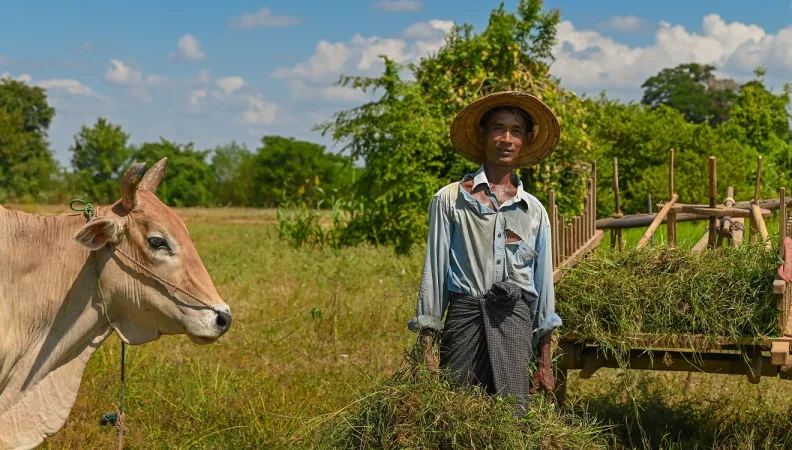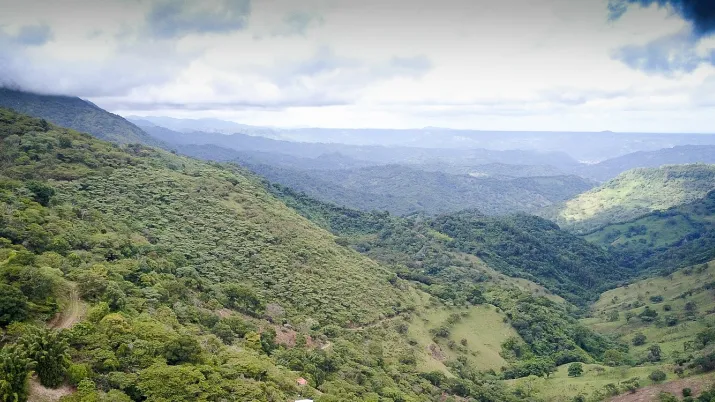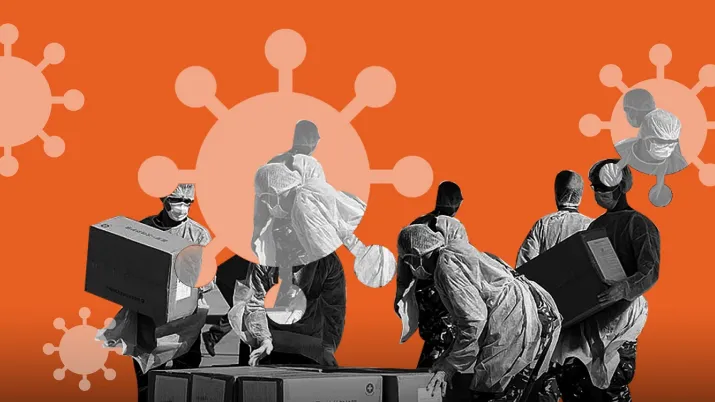Share the page
“One Health”: Responding to Pandemics with a Holistic Approach to Human, Animal and Environmental Health
Published on

The One Sustainable Health for All forum in Lyon earlier this month examined ways to anticipate - and potentially ward off - future outbreaks of disease by improving international health surveillance networks. Key to doing so begins with an understanding of the close interdependence between animal, environmental and human health – in other words, a “One Health” approach, which AFD Group is applying in a number of projects.
Article first published on 27 May 2020. Last update 3 July 2023.
Where did the coronavirus come from, pangolins? Bats? We still don’t know the exact circumstances behind its outbreak in China in late 2019, but there is one thing we are sure of since the global Covid-19 epidemic began: invasive human activities have had disastrous effects on the biosphere, and often backfire spectacularly. The examples continue to multiply: Ebola, H5N1, Marburg, Nipah, SARS, HIV, West Nile, and Zika viruses: they have resulted from close human contact with wild animals or have appeared in new areas due to environmental damage. In one case, deforestation forced bats to move closer to inhabited areas; in another case, expansion of farmland exposed laborers to natural reservoirs of pathogens; and in several regions, climate change has created conditions that favor the arrival and breeding of mosquitoes in new areas.
“Risks of contamination grow from several factors: increased human contact with new natural environments that are potential reservoirs of pathogens, trade in wildlife, domestic animals and wildlife kept in captivity in close quarters, and intensive livestock farming under deplorable sanitary conditions in urban peripheral areas,” says Gilles Kleitz, Executive Director for Sustainable Development Solutions at Agence Française de Développement (AFD). On average, three out of the five or so new human diseases that appear each year originate in animals. And – as we have seen with the Covid-19 crisis – we may be able to use medicine to treat human beings now, but it’s of no use in preventing or anticipating the risk of a future epidemic.
One Sustainable Health for All Forum: One Health Objective
The One Sustainable Health for All Forum will gather several hundred professionals in human, animal and environmental health in Lyon from 5 to 7 July 2023. This international event aims to identify and promote operational recommendations for the integration of One Health into projects, programs and policies at the local and international levels. It is building on the thinking process conducted by the One Sustainable Health for All Foundation over the last two years. This process has been organized around working groups on key sub-themes including the question of food, financing these issues and the involvement of communities.
AFD is co-organizing this event, which is closely linked to the Group’s priorities for the coming years for addressing climate change and inequality. With the escalation of crises and interdependence of environmental, health and social issues, there is an urgent need for a new approach to health. It must take the climate and environmental challenges into account, so that we can return to a pathway to progress in health and achieve the Sustainable Development Goals.
The key to substantially reducing these risks lies in giving greater consideration to the interdependence between three fields of health: human health, animal health and ecosystem health. This is what we learn from the “One Health” approach to health policies.
Its ambition? Renew our vision of health, starting with a recognition of the interdependence between these three components – human, animal, environment – and promote national and regional cooperation between professionals in these different fields.
“When doctors, veterinarians, ecologists, agronomists, sociologists and anthropologists can all contribute their views, we can better understand the multifaceted aspects of a problem,” says Marie Edan, Project Team Leader for Agriculture, Biodiversity and Rural Development at AFD, and veterinarian by profession. “Mad cow disease made us realize just how blurry the boundary is between animal and human health.”
Preventing Diseases at the Source
The One Health concept was developed in the early 2000s. Three international organizations began to implement it in their research in 2010: the World Health Organization (WHO), the World Organisation for Animal Health (WOAH, founded as OIE), and the Food and Agriculture Organization of the United Nations (FAO). In the early years, particular emphasis was placed on the control of zoonoses (diseases communicable between animals and humans, such as rabies), antimicrobial resistance, and food safety.
These organizations signed a memorandum of understanding in 2018 to step up their cooperation. It sets out the action they will take to counter future health threats: strengthen national and regional services covering human and animal health and food safety, promote research for better understanding of diseases of animal origin, and detect those disease occurrences faster in an effort to stop them from spreading. In 2022, the UN Environment Programme (UNEP) joined this alliance for the implementation of the One Health approach.
According to the WOAH, one of the members of this four-party alliance, prevention of diseases at the source is the most effective and economical solution to protect humans. The organization argues that veterinary services can play a crucial role in this prevention. By protecting animal health and well-being, veterinarians can help improve human health and food safety, in particular through better control of livestock.
However, many countries, particularly in Africa, have been suffering from substantial disinvestment in these animal health services for several decades, with serious consequences on public health. This underinvestment also concerns institutions responsible for health surveillance.
“We are encouraging governments to establish interministerial working groups to develop strategies that combine human, animal, and environmental health,” says Monique Eloit, Director General of the World Organisation for Animal Health. “One Health is a state of mind, an approach that everyone can adopt as their own. Many topics need to be viewed through that lens and addressed through joint action.”
Further reading: Health and Social Protection – 2022 Activity Report
Regional Surveillance Network
In 2009, for example, AFD supported the creation of a network for epidemiological surveillance and alert management. It is coordinated by the Indian Ocean Commission (IOC) in five countries: the Union of the Comoros, France, Madagascar, Mauritius and the Seychelles. In 2013, this group established a unit for animal health, and joined forces with the regional surveillance network led by the French Agricultural Research Centre for International Development (CIRAD). “The IOC is now implementing a very concrete rollout strategy, on the ground, to break down barriers between disciplines in human and animal health. For example, it’s supporting the creation of national One Health platforms in the recipient countries of project funds. The aim is to foster dialogue and cooperation between the key actors in ministries of human health and ministries responsible for animal health,” says Claire Giron, Regional Task Team Leader for Health and Social Protection at AFD.
In Southeast Asia, since 2013, AFD has been assisting the Institut Pasteur and its partners in the fight against emerging diseases via the ECOMORE project. This involves analyzing the impact of climate change on the outbreak of these diseases and capacity building activities on health surveillance in the region. The epidemic risk modeling conducted by the project has enabled health authorities to better target high-risk areas in the fight against dengue fever and leptospirosis. The Institut Pasteur is working with its local institutes in Cambodia and Laos, with the National Institute of Hygiene and Epidemiology in Vietnam, the National Health Laboratory in Myanmar, the Research Institute for Tropical Medicine in the Philippines and the French National Research Institute for Sustainable Development. AFD has renewed its support to this project in the context of the Covid-19 pandemic.
Innovative projects led by NGOs
“In Morocco, Libya, and Chad, we provide support for a project carried out by the Commission for Controlling the Desert Locust. Swarms of these locusts can consume up to 100,000 tons of organic matter per day and threaten the food production of whole regions. The project will improve surveillance of locust populations, in particular via computer models than can identify areas at risk of locust multiplication. That way we can focus prevention efforts on at-risk areas,” says Marie Edan.
The Sectoral Innovation Facility for NGOs (FISONG) builds partnerships between civil society organizations (CSOs) and AFD through the co-financing of innovative projects. In May 2020, AFD launched a FISONG with a budget of €2.5 million to finance one or several projects implementing an innovative One Health approach in Africa, for example, by involving communities more in prevention activities. Two projects are ongoing, one in Senegal (led by Solthis, AVSF and their partners), the other in the Guinea Forest Region (led by GRET and its partners). They focus on activities or changes in practices in response to human, animal and environmental issues, such as antimicrobial resistance, biodiversity loss, farming practices, pollution and conflicts of use.
Further reading: Health and Social Protection: Our contribution to the Sustainable Development Goals
Under its programming for external action for 2021-2027, the European Commission has launched regional Team Europe Initiatives (TEI) to coordinate and harmonize the European Union’s action on key issues. One of these TEI for health aims to improve health security in Africa based on a One Health approach and in partnership with the Africa Centres for Disease Control and Prevention (CDC). The Commission will devote more than €80 million to this issue over the period. AFD Group is actively involved in these discussions and is working with European partners on the coordination of investments with CDC Africa, with which AFD signed an agreement in 2022.
One Health helps us devise new and more effective solutions
The operational implementation of this health approach is gradually expanding. According to a study published in the Lancet Planetary Health journal, at the end of 2017, more than 100 partnerships involved organizations in a One Health approach with at least two of its components, in Africa, Asia and Europe.
“With the proliferation of environmental crises, which have an increasing number of adverse effects on health, the One Health concept makes us question traditional approaches which no longer allow us to make sufficient progress in health to achieve the Sustainable Development Goals. One Health helps us devise new and more effective solutions to address the interdependent issues of human, animal and environmental health,” says Arnaud Laurent, One Health focal point at AFD.
The Covid-19 crisis also highlighted the lack of resources allocated to health systems in different parts of the world. Indeed, in their strategies to fight the spread of the coronavirus at the start of the epidemic, most countries implemented such measures as lockdowns, mask-wearing, and social distancing – effectively putting most of the burden on their populations.
“The chronic under-investment in activities to prevent and manage crises was blatantly obvious during the Covid-19 pandemic, but it’s been a problem for many years,” says Arnaud Laurent. “It’s the responsibility of States, but also international donors which haven’t sufficiently invested in activities to structure systems.” For Monique Eloit, countries that have already adopted or experimented with health approaches that simultaneously consider humans, animals, and the state of the environment have proven to be best prepared to deal with the Covid-19 pandemic.
It is in this context that the initiative called PREZODE (Preventing Zoonotic Diseases Emergence), supported by AFD Group, was developed. Announced by the French President at the One Planet Summit in January 2021, PREZODE is an international initiative addressing all the challenges related to the prevention, surveillance, early detection and rapid response to risks of zoonotic pandemics. AfriCam, the first project supported, aims to strengthen surveillance and early detection systems in four African countries, as well as in Cambodia. PREZODE already gathers an international community composed of 21 countries, including France, and more than 200 organizations from the scientific, academic and voluntary worlds.
One Health is now gaining momentum in addressing the effects of the climate crisis and environmental disruptions on health. Indeed, these risks are projected to increase: climate change already has many direct and indirect effects on human health, and the decline in biodiversity poses a potentially greater threat, notably to our food security.
“Whatever happens, we must shift towards a balance of the overall ecosystem,” says Marie Edan. Pangolins, bats, human, animal, environmental… it is now essential to capitalize on the experience already in progress of One Health projects and step up interventions that meet these criteria. And what if one day One Health became a way of life?


